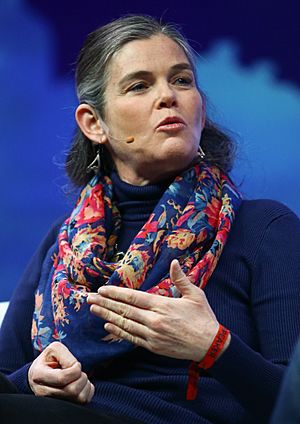Daphne Koller facts for kids
Quick facts for kids
Daphne Koller
|
|
|---|---|

Koller in 2019
|
|
| Born | August 27, 1968 Jerusalem, Israel
|
| Education | Hebrew University of Jerusalem (BSc, MSc) Stanford University (PhD) |
| Known for | Machine learning Graphical models MOOCs Coursera |
| Awards | ISCB Fellow (2017) IJCAI Computers and Thought Award (2001) MacArthur Fellow (2004) PECASE (1999) ACM Prize in Computing (2007) |
| Scientific career | |
| Fields | Machine learning Computational biology Computer vision Artificial intelligence |
| Institutions | Stanford University University of California, Berkeley |
| Thesis | From Knowledge to Belief (1994) |
| Doctoral advisor | Joseph Halpern |
| Doctoral students |
|
Daphne Koller (born August 27, 1968) is a brilliant computer scientist from Israel and America. She used to be a professor at Stanford University, teaching computer science. She also received a special award called the MacArthur Fellowship. Daphne is famous for helping start Coursera, a website where you can take online courses from top universities. Her main work involves AI (which is like teaching computers to think) and using it to help with medicine and biology. In 2004, MIT Technology Review magazine featured her work on "Bayesian machine learning" as one of "10 Emerging Technologies That Will Change Your World."
Contents
Early Life and Education
Daphne Koller was born in Jerusalem, Israel, on August 27, 1968. She was a very bright student! She earned her first college degree from the Hebrew University of Jerusalem in 1985 when she was only 17. Just one year later, at 18, she received her master's degree from the same university. She then moved to the United States and completed her PhD at Stanford University in 1993. Her advisor for her PhD was Joseph Halpern.
Career Highlights
After finishing her PhD, Daphne Koller continued her research at the University of California, Berkeley from 1993 to 1995. In 1995, she joined the computer science department at Stanford University as a professor.
Awards and Recognition
Daphne Koller has received many important awards for her work.
- In 2004, she was named a MacArthur Fellow. This is a very special award given to talented people in various fields.
- In 2011, she was chosen to be a member of the National Academy of Engineering. This honor recognized her contributions to how computers understand and learn from information, especially in areas like robotics, computer vision, and biology.
- She also became a fellow of the American Academy of Arts and Sciences in 2014.
- In April 2008, she received the first-ever $150,000 ACM-Infosys Foundation Award in Computing Sciences.
- Most recently, in 2023, she was elected to the National Academy of Sciences.
Founding Coursera
In 2012, Daphne Koller teamed up with Andrew Ng, another computer science professor from Stanford. Together, they started Coursera. Coursera is an online platform that offers courses from universities and companies all over the world. It makes learning accessible to millions of people. Daphne served as the co-CEO and later as the president of Coursera.
Her work in online education was highly praised:
- In 2010, Newsweek named her one of the "10 Most Important People."
- In 2012, Time magazine included her in their list of the "100 Most Influential People."
- In 2014, Fast Company recognized her as one of the "Most Creative People."
New Ventures in Health and AI
Daphne Koller left Coursera in 2016 to work at Calico. Calico is a company that focuses on understanding aging and finding ways to improve human health.
In 2018, she started her own company called Insitro. This company uses machine learning and genomics (the study of genes) to discover new medicines. Insitro has automated lab equipment that runs on special computer programs. This helps them predict and test treatments for diseases much faster.
In 2020, Daphne Koller also co-founded another startup called Engageli. This company created an online learning platform that offers a better experience than typical video call apps. It helps keep students engaged and can even check in real-time if students are understanding the material.
Research in Artificial Intelligence
Daphne Koller's main research interests include how computers can represent information, make decisions, and learn. She often applies her findings to computer vision (teaching computers to "see") and computational biology (using computers to solve biology problems).
Predicting Health Issues
One cool project she worked on was called PhysiScore. With her colleagues Suchi Saria and Anna Penn, she developed this system. PhysiScore uses different pieces of data to predict if premature babies might have health problems. This helps doctors give them the best care.
Bayesian Machine Learning
Koller's work in artificial intelligence builds on an old idea from the 18th century called Bayes' rule. This rule helps improve a guess about something as you get more information. Daphne Koller is a leader in expanding this idea. She helped create software that can find patterns in huge amounts of data.
In 2009, she co-wrote a textbook about "probabilistic graphical models" with Nir Friedman. She even offered a free online course on this topic starting in 2012.
Mentoring Future Scientists
Daphne Koller has also guided many students who went on to become successful scientists themselves. Some of her former doctoral students include Lise Getoor, Mehran Sahami, Suchi Saria, Eran Segal, and Ben Taskar.
Books
Daphne Koller has written or contributed to important books in her field:
- She wrote a chapter in the 2018 book Architects of Intelligence: The Truth About AI from the People Building it by Martin Ford.
- She co-authored Probabilistic Graphical Models: Principles and Techniques with Nir Friedman.
Personal Life
Daphne Koller is married to Dan Avida. He is a venture capitalist, which means he invests in new companies.
See also
 In Spanish: Daphne Koller para niños
In Spanish: Daphne Koller para niños
 | Ernest Everett Just |
 | Mary Jackson |
 | Emmett Chappelle |
 | Marie Maynard Daly |

